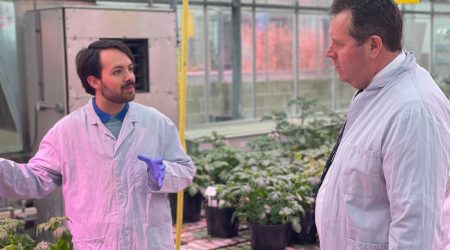John Innes Centre responds to new legislation for gene editing research in plants

The John Innes Centre has welcomed changes to the regulation of genome edited plants announced by Defra today, which aim to cut unnecessary red tape when using the technology in plants for research and development.
The rule changes mean that scientists and plant breeders across England will be able to undertake plant-based research and development using genetic technologies such as gene editing more easily.
The rules will apply to plants where genome editing is used to create new varieties similar to those which could have been produced more slowly through traditional breeding processes, and will unlock research opportunities to grow crops which are more nutritious, and which require less pesticide use.
Scientists undertaking research with genetic technologies will continue to notify Defra of any research trials. For now, gene edited plants will still be classified as genetically modified organisms and commercial cultivation of these plants, and any food products derived from them, will still need to be authorised in accordance with the existing rules.
Director of The John Innes Centre, Professor Dale Sanders FRS said: “At the John Innes Centre we use gene editing to understand and develop crops which are more nutritious and resilient to climate change and diseases. Gene editing is a powerful technique that will play a critical role in helping us address the global challenges of climate change and food security while at the same time ensuring biodiversity.
Gene editing provides an opportunity to revolutionise our food systems. However to benefit fully, we have to address the way we regulate this technology. Defra’s announcement today is step in the right direction, that will allow researchers to run more field trials of gene-edited crops. I am therefore pleased to see the Government acting to bring these changes in.”
To make the most of these discoveries, we need to translate our science to benefits for consumers by making products available on supermarket shelves. I look forward to working with Defra as it continues its wider review of regulations around genetic technologies. Getting this right will be essential if we are to fully benefit from this innovative technology.”
The legislation follows the launch of the Government’s response to the gene editing consultation last year. It is the first step towards adopting a more scientific and proportionate approach to the regulation of genetic technologies, which will allow us to further unlock innovation using these technologies.
Chief Scientific Adviser, Professor Gideon Henderson, said: “Gene editing is a powerful tool that will help us make plant breeding more efficient and precise by mimicking natural processes that currently take many years to complete.
“With the new rules now formally in place, scientists will be able to assess new crops in real-world conditions more easily. This will increase our ability to harness the potential of gene editing to efficiently help grow plants that are more nutritious, beneficial to the environment, more resilient to climate change, and resistant to disease and pests.”
Harnessing the genetic resources that nature has provided through genetic technologies will create new opportunities for farmers to grow more resilient crops. This will support the development of new and innovative ways to protect the environment, such as significantly reducing, or eliminating the use of pesticides and herbicides – protecting pollinators. Another potential benefit includes making crops more resilient to climate change.
For example, John Innes Centre researchers used gene-editing techniques to explain how a key gene in wheat called ZIP4 has such a profound effect on seed production, and how it can now be deployed to increase the efficiency of introduction of traits with increased resilience to climate change into wheat.
“Our research priority is now to identify variations of the ZIP4 gene which maintain fertility under different temperature regimes. We aim to identify variants of the gene with effects that give wheat yield resilience to climate change,” said Professor Graham Moore, who led the study.
Minister for Agri-Innovation and Climate Adaptation Jo Churchill said: “New genetic technologies could help us tackle some of the biggest challenges of our age – around food security, climate change and biodiversity loss.
“Now we have the freedom and opportunity to foster innovation, to improve the environment and help us grow plants that are stronger and more resilient to climate change. I am grateful to the farming and environmental groups that have helped us shape our approach, and I look forward to seeing what we can achieve.”



